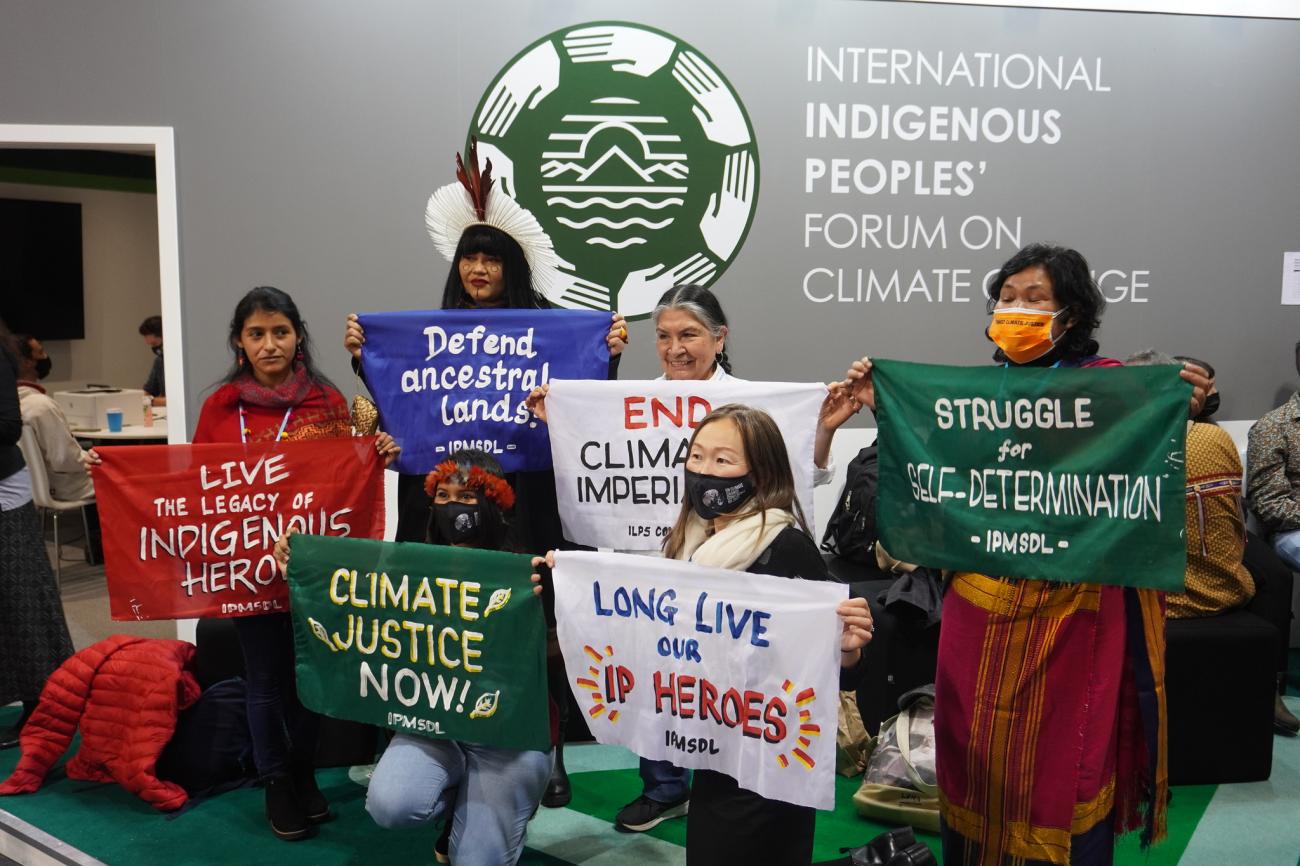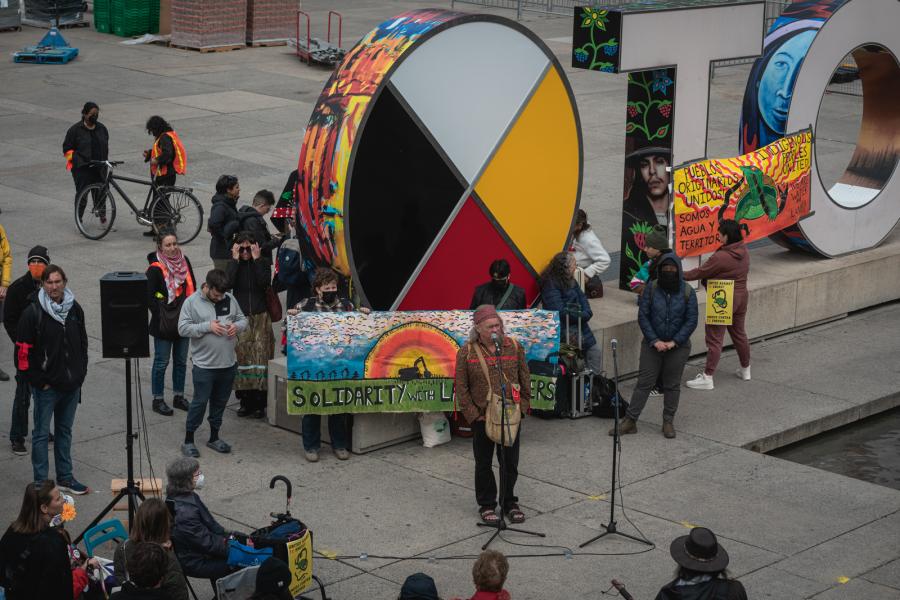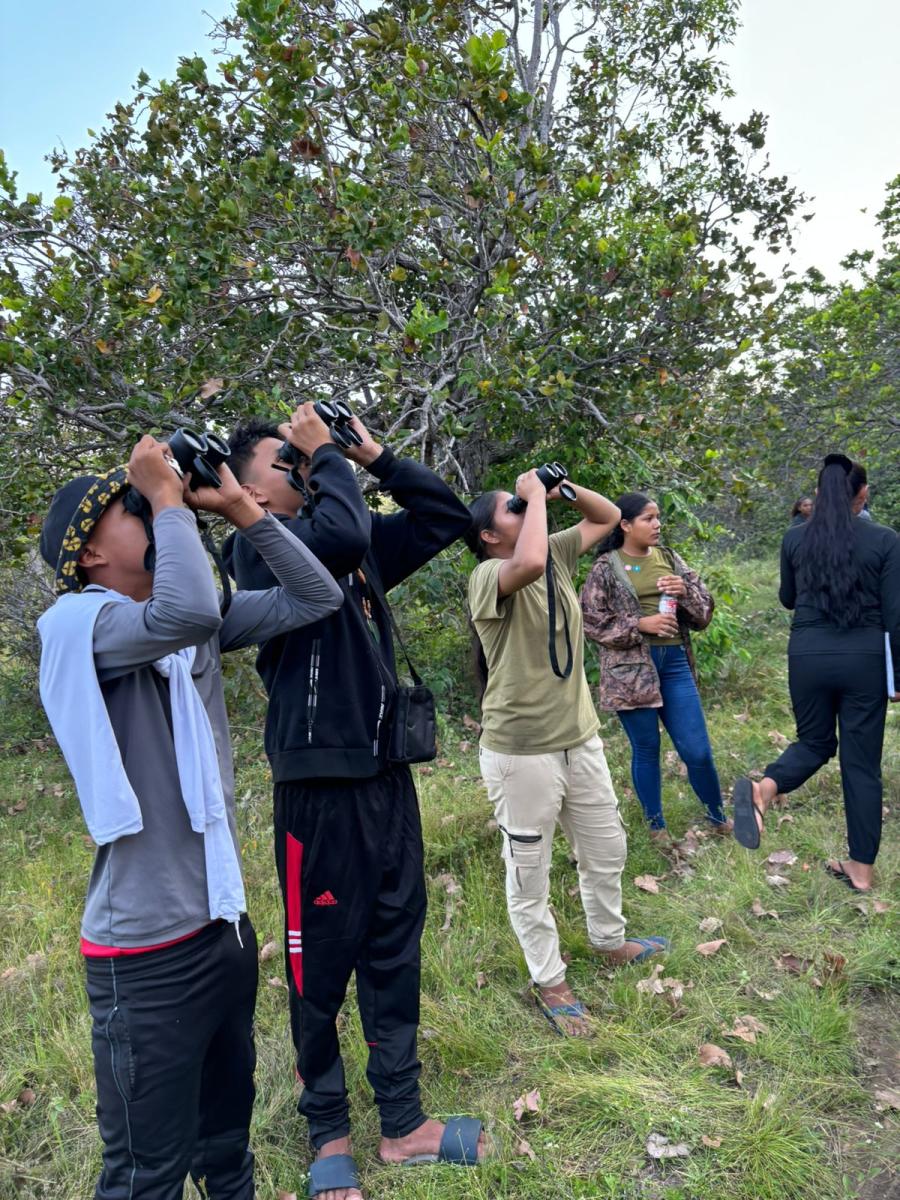
Reporting from Glasgow! Recap from the First Week at COP26
World leaders, governments, NGOs, Indigenous Peoples, civil society, academic, science, media, and press institutions have come together to meet in Glasgow, Scotland, for the United Nations Framework Convention on Climate Change (UNFCCC) Conference of Parties (COP 26).
As week 1 of COP26 comes to a close, our delegation participated in various dialogues and presentations pertaining to the proposed solutions to address climate change mitigation and adaptation, loss, and damages of our ecosystems as well as climate finance. Alongside many other Indigenous leaders present inside #COP26 and others who took to the street to protest the climate conference, Cultural Survival's Indigenous women-led delegation denounces nature-based and scalable solutions as they are false solutions that continue to displace and criminalize Indigenous Peoples on their own lands and territories and also commodifies, extracts and exploits our environments.
Our delegation will continue to directly engage at the second week of COP26 by centering and uplifting Indigenous Peoples' rights, solutions, and traditional knowledge in tackling climate change, advocating for direct funding to support Indigenous Peoples' land titling, tenure, stewardship, and self-determination, and amplifying the voices of Indigenous Peoples across the seven socio-cultural regions of the world.
Join us in listening to some Indigenous leaders across the world to hear their work at #COP26.

Daisee Francour (Oneida), Director of Strategic Partnerships and Communications, speaking on a panel on the 30x30 Initiative at the International Indigenous Peoples’ Forum on Climate Change Pavilion. Watch the panel recording here (at 5:31:01)

Galina Angarova (Buryat), Executive Director, speaking at a panel at the International Indigenous Peoples’ Forum on Climate Change Pavilion, Showcasing Indigenous-led Climate Work. Watch the panel recording here (at 56:23).
"As Indigenous Peoples, we carry traditional knowledge which is born from the direct relationship between the land and our people - that's the magic solution to protecting our territories...We have been coming to these events for decades but we are not being listened to. We know what we are doing... Let our people protect our forests. Let our people protect our lands. Let the government leave us alone," said Galina Angarova today at Global Landscapes Forum's event, Positive Tipping Points for Transformative Change (Watch at 1:32:38).
Help resource our Indigenous delegation by making a gift!

Avexnim Cojti (Maya K'iche'), Director of Programs, interviewing Joan Carling (Kankanaey).
Indigenous Voices from COP26

Cultural Survival At COP26 - An Interview With Fawn Sharp

Our Babies Are Born Pre-Polluted With Mercury

Indigenous Knowledge Is Fundamental To The Preservation Of Humanity

The Impact of Global Decisions on Local Communities - Joan Carling at COP26

Victoria Tauli-Corpuz on Funding Climate Change and the Transition into the Green Economy

The Pacific Region Is Present at COP26!

Edson Krenak Advocates for the Rights of Indigenous Peoples in Brazil at COP26

COP26 y la participación de mujeres Indígenas
¿Cómo el cambio climático esta afectando las comunidades Indigenas? ¿Cuáles son las expectativas de las mujeres Indigenas que participan en esta conferencia? Escuchemos estas y otras respuestas interesantes a través de la entrevista realizada por nuestra compañera Avexnim Cojti quien conversó con Kainaku Kaimará y Simone del Pueblo Karipuna.

COP26 y la juventud Indígena
La participación de las delegaciones de Pueblos Indígenas en COP26 se hacen presentes para abordar sobre este tema, tal como lo podrá escuchar en esta entrevista realizada a Jocabed Solano Directora de la organización Memoria Indígena.

COP26, mujeres Indígenas buscando justicia climática
Escuchemos una entrevista realizada en COP26 por Avexnim Cojtí a Ericka Xananine, mujer joven Indígena integrante del colectivo La Tlacuacha Compartida.
Cultural Survival's Events at COP26
Nov 7, 2021 | 12:30 PM GMT - 1:30 PM GMT
Indigenous Women in Climate Change Solutions: A Holistic and Rights-based Approach to Forests, Food and Finance (virtual access)
Register
In this session, Cultural Survival and the Global Landscapes Forum seek to bring Indigenous women leaders to speak about their leadership in addressing climate change: how we are advocating for this work at the national, regional, and international levels, what we are doing at the community level and share our success stories.
November 9, 2021 11:30 AM - 1:00 PM GMT (UK)
Earth observation-based innovation by and for Indigenous women for climate change adaptation
Tower Base North
Group on Earth Observations (GEO) Indigenous Alliance and Cultural Survival are organizing an Indigenous-led session to address the under-representation and inequality that Indigenous women face, as well as inspire the next generation of women to leverage existing technologies to find creative, low-cost, and sustainable solutions to the climate crisis, in particular, addressing adaptation and nature-based solutions. Indigenous women are key climate defenders who possess invaluable knowledge and expertise for climate change responses, yet they are the most affected by climate change. Earth observation (EO) data and tools co-designed by and/or with Indigenous communities are enabling Indigenous women and youth to integrate their Indigenous knowledge with climate change adaptation plans. This is also enabling their voices to be heard in climate policy decisions at the local, national and international levels. Indigenous women will share their innovative projects whilst also outlining the challenges and barriers they face implementing their projects.




